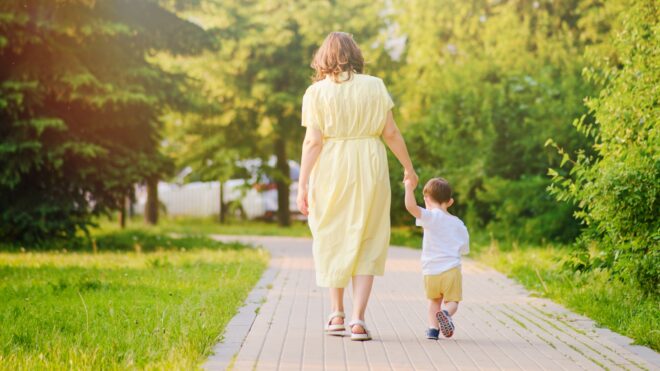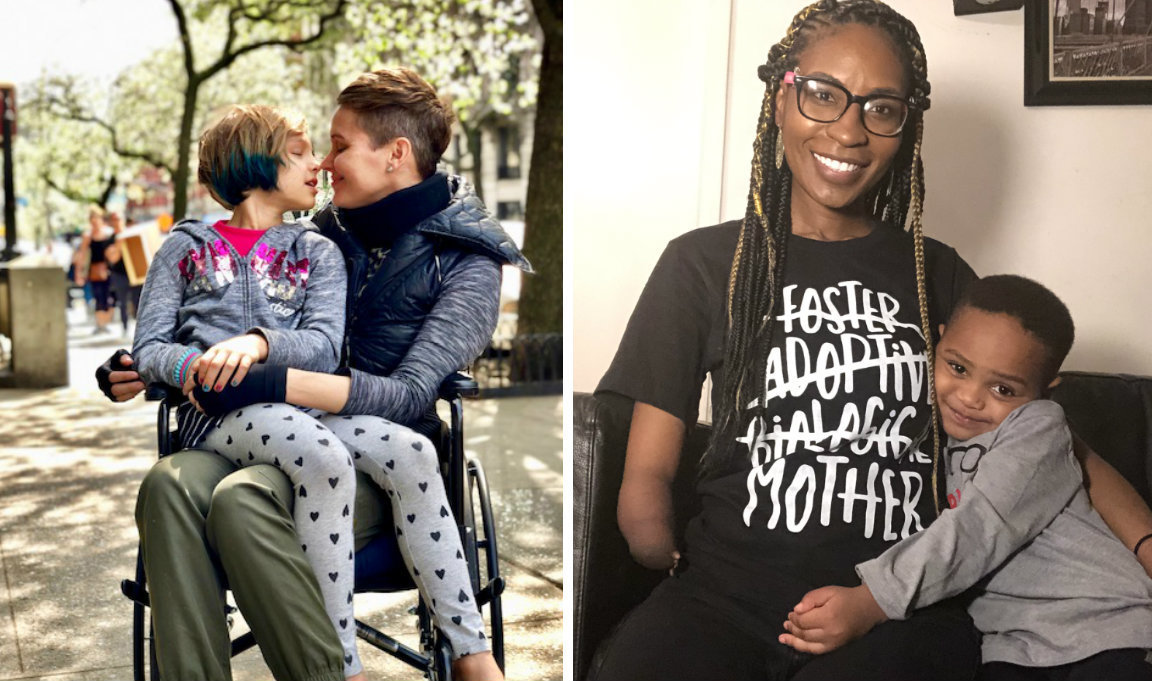
This article is part of a series dedicated to providing support and visibility to motherhood in every one of its forms. To read more stories on what motherhood looks like for all types of women, visit This Is Motherhood.
Parenting is challenging enough, let alone when you have a disability. Whether it’s physical or mental, the hurdles that come with raising children are that much more intense. Counting 4.1 million parents with disabilities in the US alone, CafeMom wanted to shed light on what it’s like for mothers who live with disabilities in this country.
We learned first hand from women who live with their disability every day and thrive as partners, parents, and people in a world that consistently challenges them.
Meet some incredible women who prove that motherhood is just as valid and beautiful no matter what their abilities are — or aren’t.
Analyn Brook, 35, is a divorced mom living with her three kids (8, 6, and 3) in Sunshine Coast, BC, Canada. She also happens to be a right leg amputee from childhood bone cancer.
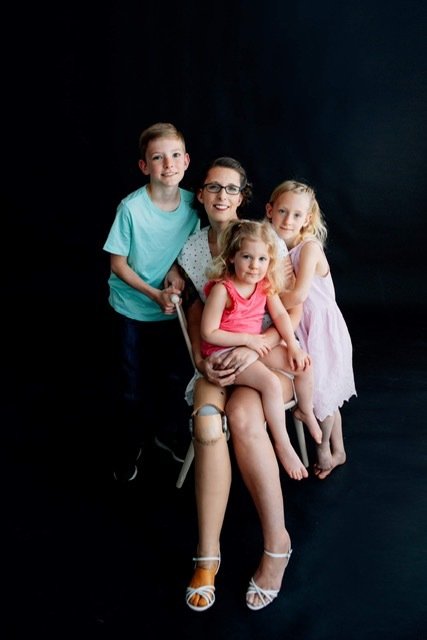
In 2017, Brook was also diagnosed with breast cancer and has had more surgeries, chemo, and is still recovering. With that comes a lot of chronic fatigue and pain, making having one leg that much harder.
On a daily basis, her disability can impact her life in a variety of ways.
“Some days I can get out of bed, put my prosthetic leg on and keep up with most day-to-day tasks,” she tells CafeMom. “It’s important to note that leg amputees have to expend much more energy to do the same task an able-bodied person can do, so even doing the basics in a day can be painful and exhausting.”
There are days when Brook’s leg is so swollen and painful that she can’t wear her prosthetic, forcing her to chase after three kids on crutches. Those days, she jokes, the TV becomes a more accepted facet of her parenting. During two out of her three pregnancies, her leg got so swollen it didn’t fit into her prosthesis.
"My disability affects how I parent in ways people may not expect. Of course there's the physical. I can't ride bikes with my children," she divulges.
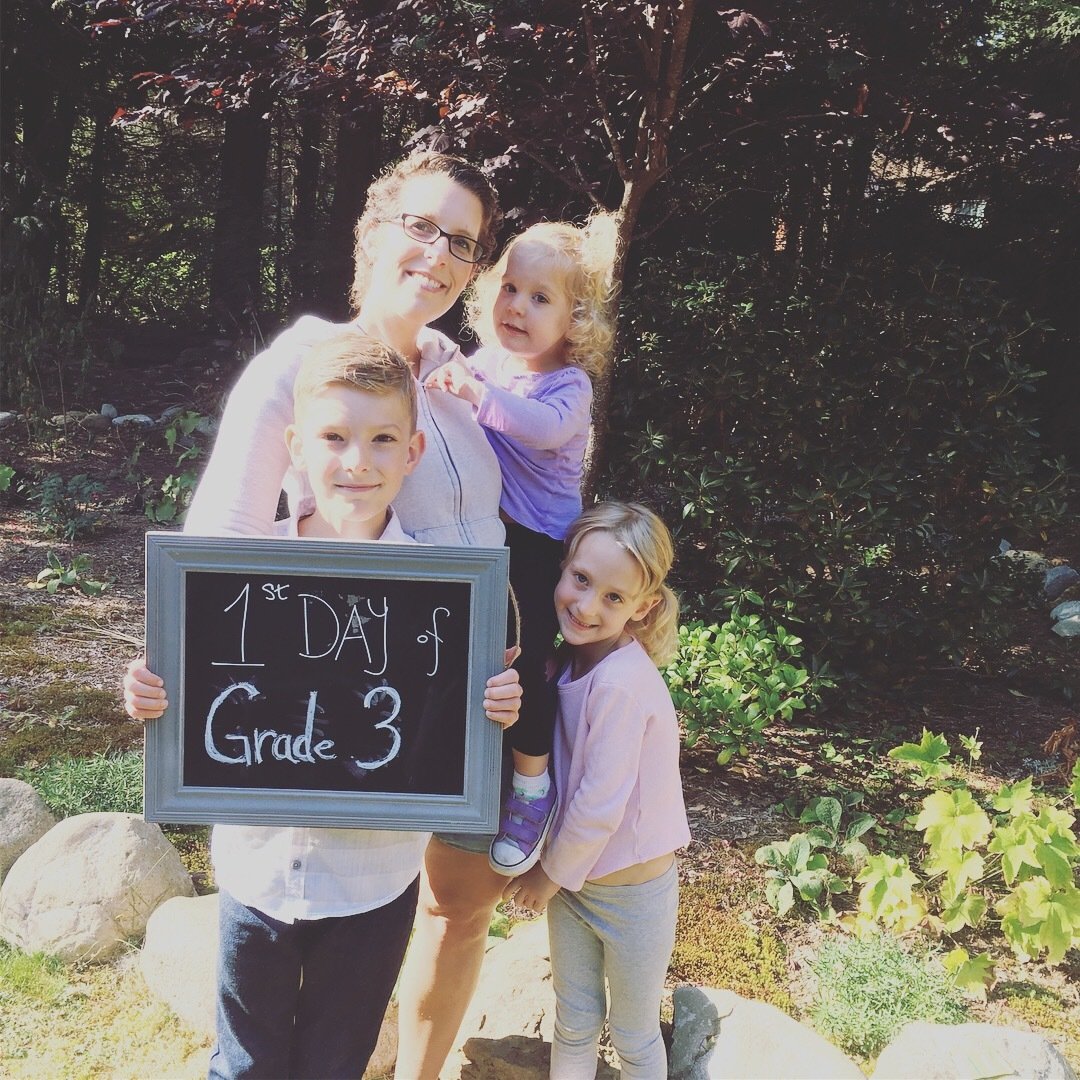
“But] the biggest way it impacts my motherhood is what I try to teach them. My disability and scars have given my children a first-hand lesson that it doesn’t matter what we look like, we all deserve love and respect. I’m showing them through example what self-love is and what body positivity looks like. It’s not uncommon for me to overhear my children’s friends ask what happened to their mom’s leg and for them to explain I had cancer and now I have a robot leg. They are very protective of me, and have compassion and empathy far beyond their years. They also have a great sense of humor, and will make jokes on how I can’t run so it’s easy to play chase with me.”
Unfortunately, her children have had good reason to be so protective.
“I was at Walmart with my children when they were very young. All the accessible parking was taken so I parked in the space for families with young children. As I got out, a woman yelled at me that just because the handicapped spots were taken it didn’t give me a right to take the family spots. I yelled back that they took my leg not my uterus and opened the back door and got my kids out. It really shook me. No part of this person thought I could be disabled AND be a mother. I have also (infrequently) been expected and harshly judged for not doing as much as people think I should be able to do. They often see me on my best days and mistake those days for being my normal.”
Because the truth is, there are a lot of things that some people don’t see.
“I wish they knew my children can see them staring or making comments about their mom, and they love their mom and think she’s beautiful. I wish they knew that sometimes I push my body past where it should go to give my kids memories and experiences. I also do so knowing I can’t do it often or I will burn out. I also wish people would know that if you park in an accessible parking stall without proper tags, my 6-year-old will notice and she will call you out, so be prepared.”
Estee Pouleris, 45, and her journey with disability isn't one she, partner Monte Isom, 44, or their daughter, Brooklyn Isom, 7, ever expected.
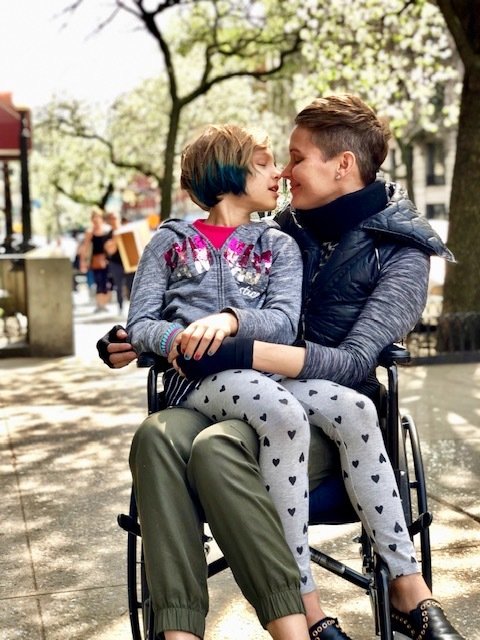
The Manhattan mom was diagnosed with Ehlers-Danlos syndrome in 2017, a genetic condition affecting the collagen in her body. She always assumed her body was merely “double jointed.” She went to the doctor because she began experiencing more dislocations, joint pain and a host of comorbidities, and she learned that she has a connective tissue disorder. Tendons holding her bones in place are now like stretched, frayed rubber bands, and her internal organs suffer too.
“My symptoms fluctuate day to day, although no days are pain-free,” Pouleris tells CafeMom. “Some days, I just need braces to support my joints to keep them in place, yet other days I need a wheelchair to get around. I am fatigued easily and deal with debilitating chronic pain.”
Pouleris also developed an allergy to almost all pain medications. Her lifestyle went from being active as a family-adventure blogger to being no longer able to manage her home maintenance, laundry, cooking, and general household duties. In addition to doctors’ appointments, she also attends four physical and occupational therapy appointments every week.
“My life went from mine … to managing my body.”
"My daughter and I had an extremely active lifestyle until my body started to really manifest symptoms," she reminisces.
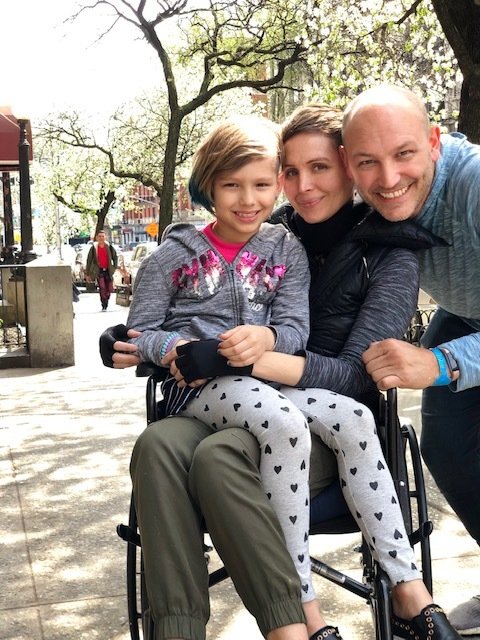
Together they traveled the world and would blog about her experiences. Since her diagnosis, her day-to-day has dramatically changed. Forget being able to travel; she now can no longer pick up or drop off her daughter at school. She also can’t make it up the stairs to her classroom or even participate in field trips.
“She recently told me she misses the way I used to be and asked when I’m going to get better. It was heartbreaking to hear, but I shared [that] I missed the way I used to be too, and am working hard with doctors to get stronger. There is no cure. It saddens me that I cannot be the role model I wished to be for her. I still am a role model, just not the way I would have chosen.”
As impactful as the diagnosis has been on her life, Pouleris has found so many people (even New York City strangers) willing to go out of their way to help her and her daughter. She admittedly wishes, however, they were more understanding about her situation.
“I get a lot of questions about getting better. I don’t think people understand what ‘getting better’ looks like for this condition. It gets worse as I age and affects every organ in my body. I get a lot of suggestions on how to get better from friends and family, particularly along the trend of ‘thinking positive.’ I want to tell these friends and loved ones that I AM positive and I do think positively. The fact that I can’t meditate this condition away is not a reflection of my spirit or mind.”
Not everyone's disabilities are visible to the eye. For Becky McKeown, 41, her life changed after being T-boned in a car while 32 weeks pregnant.
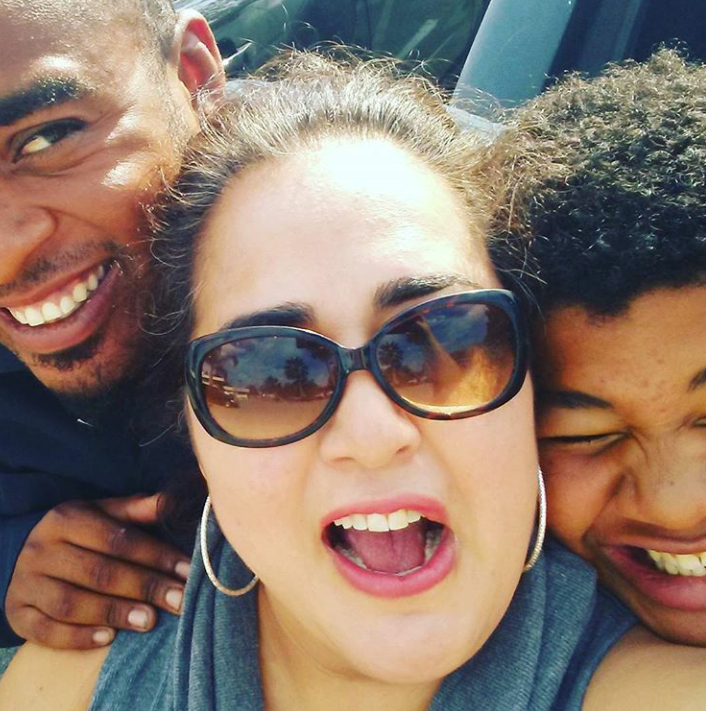
Although thankfully her baby survived, the 41-year-old single mother from Mission Viejo, California, broke everything from her sternum down in the accident, and it set off a chain of painful events she deals with to this day.
“I have had 31 surgeries since 2006, so I live with chronic pain,” she tells CafeMom. “I also suffer from PTSD from almost dying in 2013 after surgery.”
McKeown says there are days where her body feels as if it is “100 years old,” and getting out of bed is a struggle — so much so she even admits there are days where she wonders if “passing on the table” would have been easier. Of course, she feels staying around for her 24- and 12-year-old sons (and now grandson) is well worth the constant pain.
Sometimes the worst of it, though, is people simply not believing her when she says she is, in fact, disabled. “People say I don’t look sick.”
And statements like that can have devastating impacts. McKeown’s ex recently told her that she didn’t look sick and asked why she wasn’t working. He also left her when she was paralyzed after her accident, she says, with a NICU baby.
Despite all of her medical issues, McKeown is proud she has done everything she can to be the best mom she can be.
“I just had surgery number 31 last Wednesday, and my youngest said, ‘Mom, I’m so happy you’re home … things don’t work when you’re not here.’ That right there makes it all worth it.”
Katherine Wolf, 37, was living the dream with her husband and 6-month-old son in LA when she randomly suffered a massive brain stem stroke.
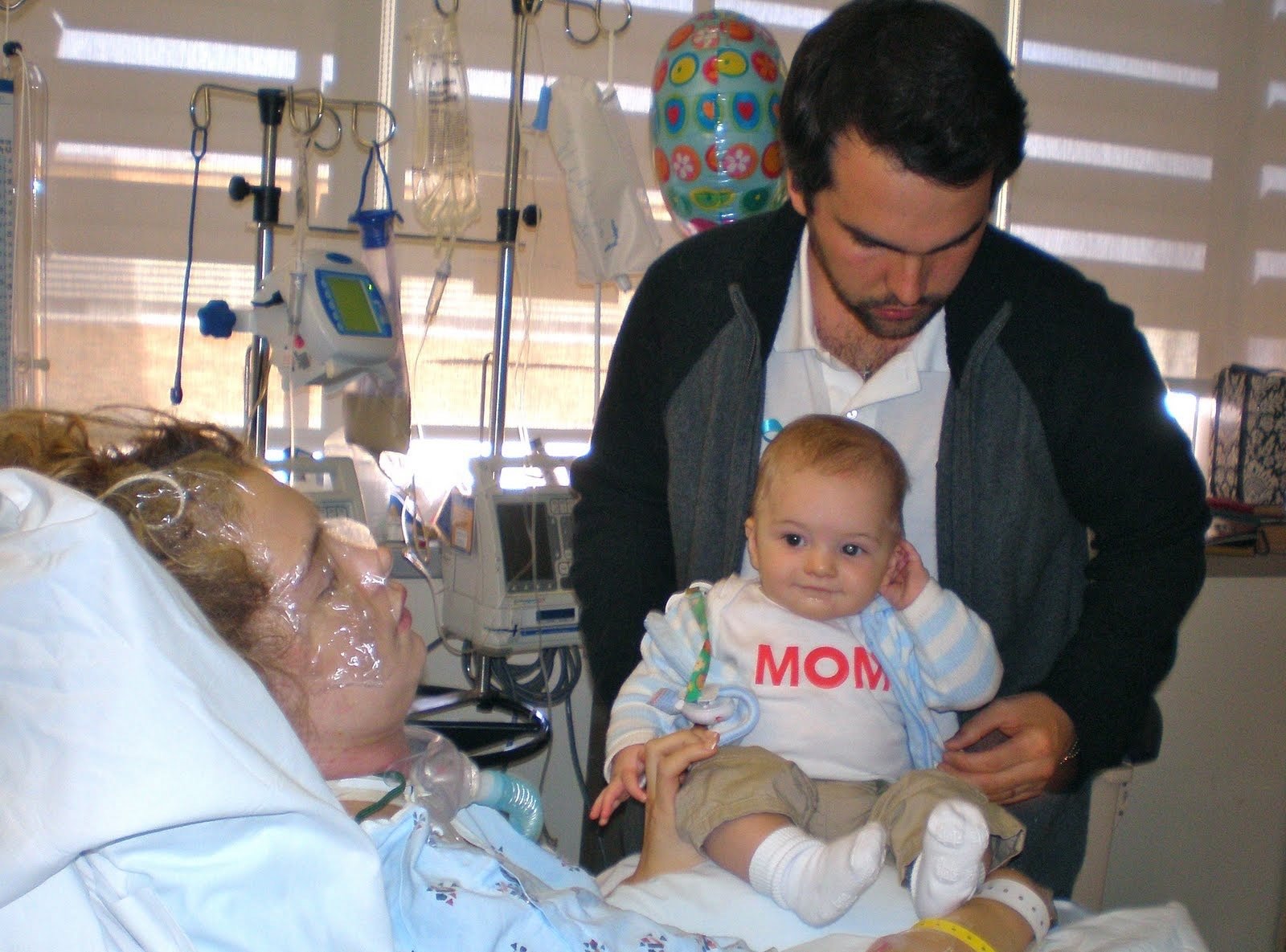
The healthy 26-year-old new mom says it came on “without warning or symptoms,” and adds that, frankly, she should have died.
“The life-saving brain surgery required removing over half of my cerebellum and sacrificing or damaging vital intracranial nerves, all of which left me with severe and life-long disabilities,” Wolf explains to CafeMom.
It took years of rehab to even get to a very basic level of functioning, and to this day, she still cannot walk well and largely uses a wheelchair or cane. She cannot drive and has double vision and deafness in one ear. Her voice changed dramatically, as she only has one working vocal cord. Her face is paralyzed, and right arm has no fine motor coordination. “I am a strong woman, but disability teaches you that you were never meant to do life on your own. My husband has cared for me every day since everything changed. And a village of family and friends has helped lift us up with such compassion.
“Despite the fact this is not the life I ever imagined living, I love my life,” she adds. “It’s a second chance, and I want to use it well. I’m doing great. I even had another miracle baby, John, several years ago.”
Though it is certainly not the life she imagined, Wolf says she loves it all the same. "It's a second chance and I want to use it well."
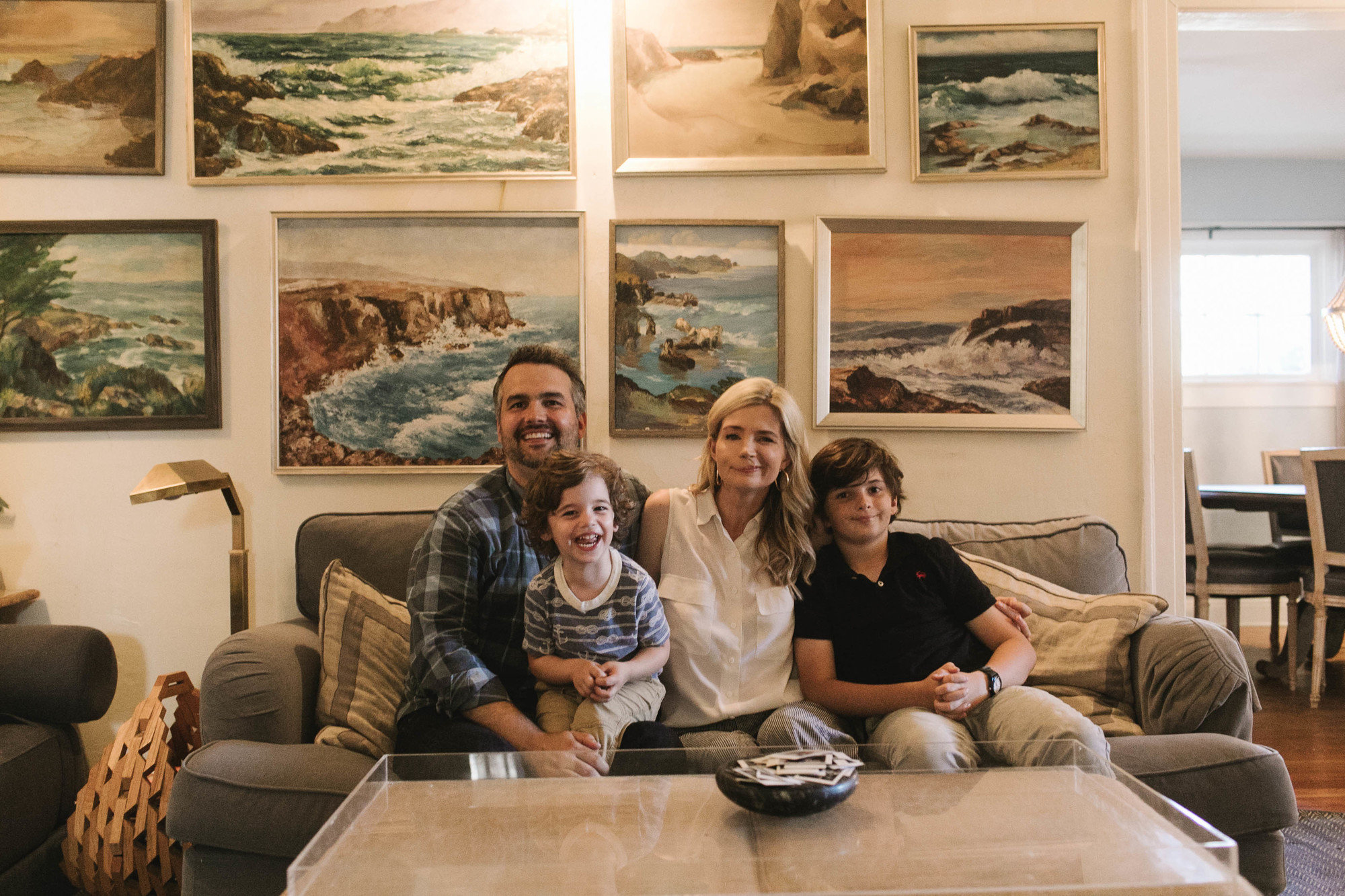
Now living in Atlanta, Georgia, aside from making improvements every day, just seven years ago she gave birth to her second son, whom she calls her “miracle baby.”
Motherhood has served as both her desperation and motivation.
“Of all the losses of ability and all the painful struggles since my stroke, losing my motherhood was the hardest by far. Early on, my brain couldn’t process that other people had been caring for my baby, who had previously been my sidekick, exclusively breastfed,” she tells CafeMom.
After realizing she couldn’t care for him, she says that relearning to do that was a huge motivator for her to heal as much as possible. With the arrival of her second son, Wolf also says her experience was “profound,” as she learned to rewire her brain into doing simple tasks like holding him and not dropping him.
Of course, there isn’t a rainbow without a little rain, and although Wolf doesn’t experience negativity on the regular, she does acknowledge that her disability can impact her children.
“I remember our older son, James, was in early elementary school, and he was waking up more to the fact that his mom was different than the other moms. There was a kid in his class who would taunt him and kind of bully him, and another well-meaning mom who knew the bully came to my door with a revelation. ‘James is being bullied BECAUSE you’re in a wheelchair!’ she proclaimed matter-of-factly, like Sherlock Holmes. I felt so ashamed and heartbroken. I knew my children would experience some unique losses because of my disabilities, but I hadn’t imagined my disabilities might cause this kind of hurt in their lives. Jay, my husband, wisely redirected my thinking by saying, ‘The kid bullying James isn’t doing it because you’re in a wheelchair. He’s doing it because he’s a little jerk!’ In all the situations and more, it’s easy to stay in victim mentality, like no one could understand, but compassion is key to the healing of our own hearts and to helping shape our kids’ hearts, too.”
And the truth is, comments like that hardly stop Wolf from living her best life. She even wrote a book Hope Heals and started an organization for disabled families called the Hope Heals Camp.
“We always try to over-communicate that our lives are far from perfect. … It’s hard to keep showing up every day to an unknown future and uphill battles, and sometimes, I get down. We’ve found wonderful therapists for our marriage and even our kids who we’re so grateful to be able to work with to get outside our own heads and negative patterns.”
For 28-year-old New Jersey mom of three Jaleesa Graham, her disability has been a part of her all her life.
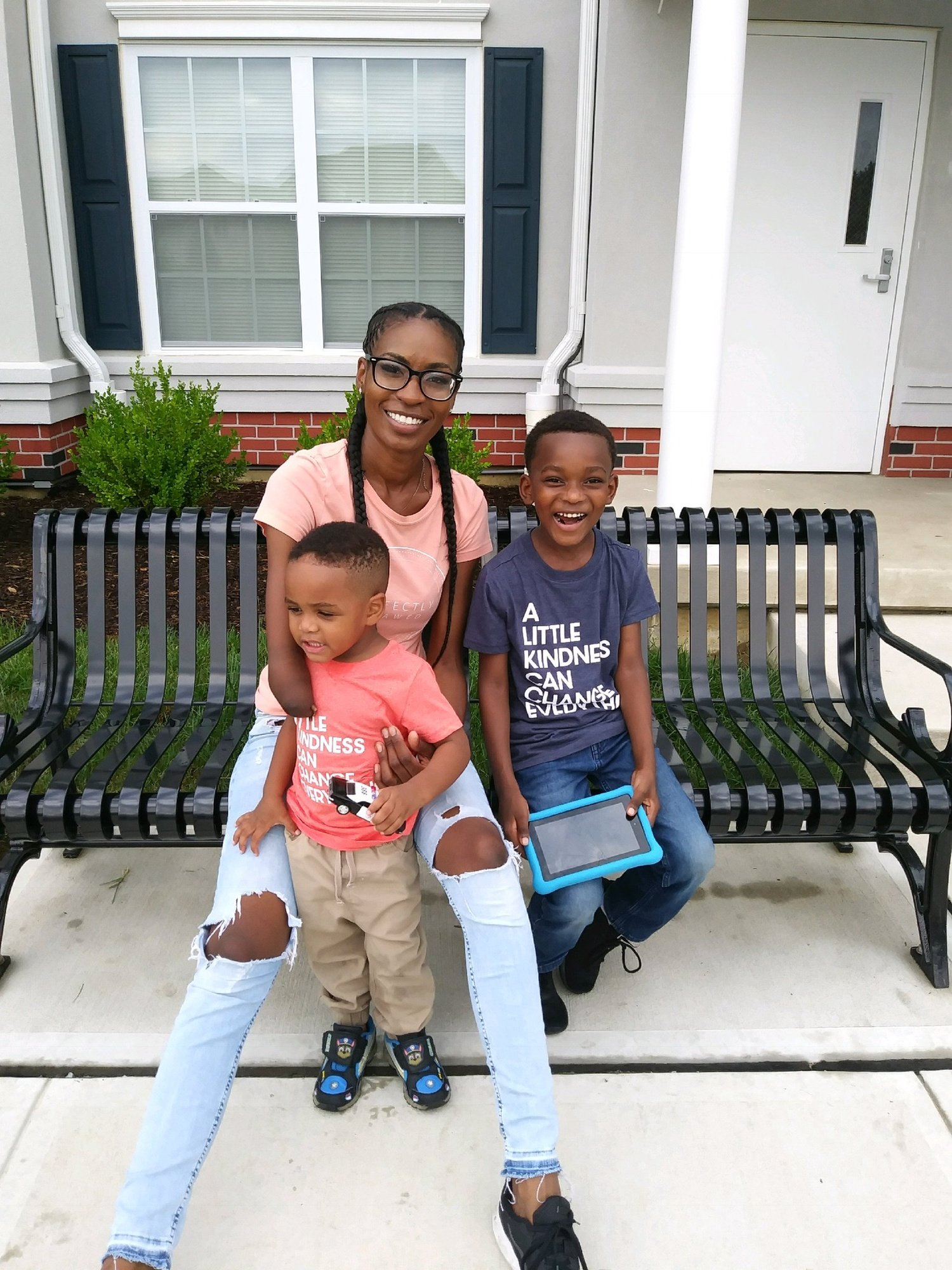
“I was born missing the lower half of my right arm, I have a limb difference. Although in the past my difference has affected my self-esteem, I never let it affect my ability to adapt and to get things done. I can do anything I set my mind to; I just have to find a way for me to do it. I have little life hacks that help me out day-to-day with my limb difference. I am independent, and day-to-day I dress myself, I clean up after my children, make meals, drive, do my makeup and hair, change diapers, typical mom stuff, and I do it all with one arm.”
She has mobility in the lower half of her right arm, so she puts it to use, such as carrying groceries. Though she can’t grab with her right arm, she uses it to help steady her left hand to tie her own shoes and to help make a knot. To do her hair in a ponytail, she leans against a wall and uses it to make up for the part of the right arm that she’s missing to make a pull-through loop. She can even braid her daughter’s hair.
She’s a mom to three: 1 biological son (7), 1 adopted son (3), and a new foster daughter (1), and has no time to slow down. Though she maintains that her day-to-day life is just like any other mother, Graham does feel that her disability has had a positive impact on her children.
“Because of my disability, I work hard to be a great example for my children. I want to show them that you can do anything you set your mind to and to never allow the world’s thinking to limit what you know you are capable of. My kids learn a lot from me because of my disability. They see the importance of trying until you succeed and making the most of your situation. Also, being a mom has taught me that I am stronger than I ever knew.”
The most frustrating thing for Graham about her disability is the limitations others place on her.
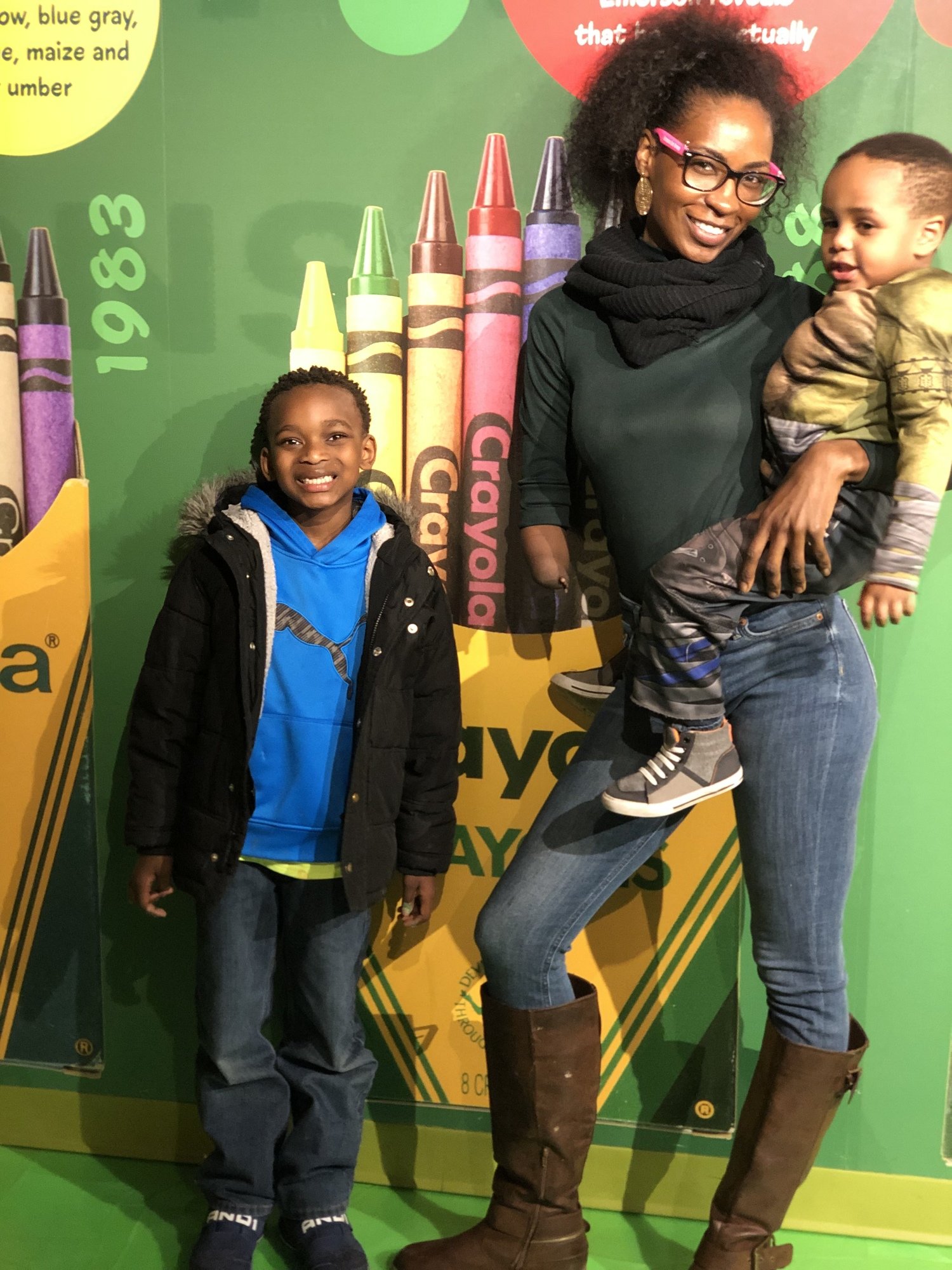
“When I am alone with my three children, a lot of people wonder how I get things done or assume that I need help, but I don’t. When I am food shopping people always treat me like I am not capable of carrying bags or pushing a cart because of my arm. I know that most people have good intentions, but it bothers me that they think I am not capable of simple things like pushing a grocery cart or carrying bags of groceries.”
And most of all, Graham doesn’t want anyone’s pity.
“My situation is nothing to feel sorry about. I don’t need your sympathy or limitations. I was born missing the lower half of my right arm, but I am just as capable and able as you are. I can do anything you can do, and I am happy with who I am and my arm does not limit my abilities. I am just like everyone else; I’m just a bit more unique.”
For 25-year-old Amy Miller, her husband, Alex, and their son of Ontario, Canada, disability has impacted their lives, but hasn't inhibited it.
“I have Marfan syndrome,” explains Miller. “It is a connective tissue disorder and affects me in many different ways. I have heart issues, bone and joint issues, gastrointestinal issues, and more. This impacts my mobility, and as a result I depend on various devices such as a wheelchair and forearm crutches. Other simple tasks such as cooking, cleaning, self-care, can sometimes be difficult depending on what kind of day I am having.”
Though she does struggle in some day-to-day activities, overall, Miller sees herself and her motherhood much like anyone else’s — with a few adaptations.
“My disability impacts motherhood for me by making it difficult to do things like pick up and carry my son, or chase after him. Some days it’s very tiring. But his love has taught me just I’m capable of. There are many things that we have to adapt, and it’s always changing as he grows. I think it’s interesting how creative we can be in finding ways to get through our day. Right now, I am teaching him to ride on my lap while I push myself in my wheelchair. This will make getting around easier for us.”
When things are especially tough, Miller relies a lot on Alex, who is her sole caretaker. He physically carries her when she cannot stand and he even learned how to braid her hair. He bathes her, changes her, and manages her medication when she cannot.
One of the worst parts of Miller's disability, aside from the pain, exhaustion, and frequent hospital visits, is people's general ignorance.
The young mother has dealt with her fair share of rudeness and lack of support — often at the hands of complete strangers. But her most harrowing experience came from someone in the medical field.
“The worst comment was made by an anesthetist before I was put under for gallbladder removal surgery. She told me it was her medical, professional opinion that all people with Marfan syndrome should be sterilized. It’s something that still haunts me to this day. That was a very traumatic experience for me. I think, ultimately, people are afraid of what they don’t understand. Many think our situation is something that could never work for them, and that’s okay. It works for us. Most days.”
Motherhood isn't a one-size-fits-all dress every woman can slip on. It isn't a defined position we hold with set requirements.
It goes beyond co-sleeping debates and Ferber method arguments. Motherhood is malleable. It’s terrifying and heartbreaking and soul-sucking and life-giving. And it’s different for each of us.
But one thing about motherhood is universally true — if the kids are loved and cared for with a mother’s whole being, no matter what that being looks like or has the ability to do, it is damn beautiful.



